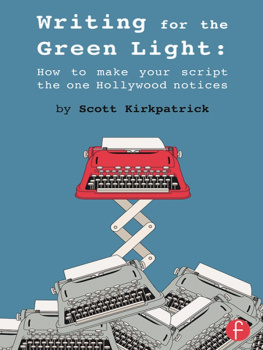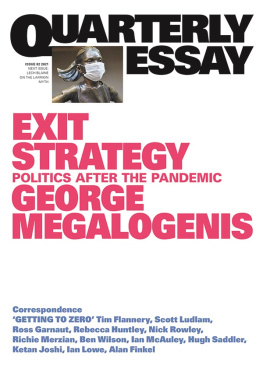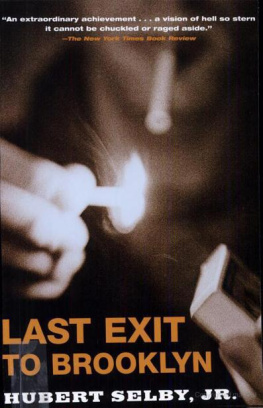Contents
Guide
Pagebreaks of the print version

The Virtues of Exit
The Virtues of Exit
On Resistance and Quitting Politics
JENNET KIRKPATRICK
The University of North Carolina Press CHAPEL HILL
2017 The University of North Carolina Press
All rights reserved
Set in Utopia by Westchester Publishing Services
Manufactured in the United States of America
The University of North Carolina Press has been a member of the Green Press Initiative since 2003.
Library of Congress Cataloging-in-Publication Data
Names: Kirkpatrick, Jennet, 1970 author.
Title: The virtues of exit : on resistance and quitting politics / Jennet Kirkpatrick.
Description: Chapel Hill : University of North Carolina Press, [2017] | Includes bibliographical references and index.
Identifiers: LCCN 2017015697| ISBN 9781469635385 (cloth : alk. paper) | ISBN 9781469635392 (pbk : alk. paper) | ISBN 9781469635408 (ebook)
Subjects: LCSH : DissentersPolitical aspects. | Separation (Psychology)Political aspects. | Political participation. | Government, Resistance to. | Exiles.
Classification: LCC JC 328.3 . K 47 2017 | DDC 303.6/1dc23 LC record available at https://lccn.loc.gov/2017015697
Chapter 1 was previously published in a different form as Exit out of Athens? Migration and Obligation in Platos Crito , Political Theory 43, no. 3 (June 2015): 35679. Chapter 2 was previously published in a different form as Walking Away with Thoreau: The Pleasures and Risks of Exit, American Political Thought 5, no. 3 (Summer 2016): 44666. Both are used here with permission.
For Dan Silverman
Contents
Platos Crito
Thoreau
Fugitive Slave Narratives
Political Exiles
Acknowledgments
A friend pointed out that I experienced quite a bit of exit in my own life while working on this book. This is certainly true, and in many ways this is a personal book. It arose from a concern for how to walk away from fellow activists to whom I felt a deep obligation and responsibility. My sense of duty urged me to stay and work for change on the inside, while other equally compelling commitments pointed toward leaving. Haunted by this situation, I did what scholars have done for centuries: I looked for understanding in great political texts, and I sought insight in the lives of political activists and exiles. I wanted to understand the dilemma of exit in a more universal way, not just as I had experienced it, and I wanted to learn about different approaches to resolving it. What I discovered will, I hope, be meaningful to others who feel torn by the prospect of exit because they feel the full weight of their political obligations.
Lars Rensmann has been a constant intellectual companion throughout the writing of this book, and my conversations with him have been one of the best parts of writing it. From start to finish, Lars has given me good advice, some of which I had the wisdom to take, and he has renewed my confidence in this intellectual endeavor. Jim Morone, Suzi Dovi, Don Herzog, and Terry Ball closely read sections of the book and offered crucial ideas, references, and cautions. It has been a great intellectual pleasure to talk and learn from them. I owe a special debt to Dan Silverman, who encouraged me to write about exit from the perspective of a political theorist. Dans enthusiasm for the project encouraged me greatlyIm not sure I would have written this book without it.
Chapters of the book were presented at seminars at the University of California, Santa Barbara; the University of Virginia; Arizona State University; and the University of Michigan. I profited from the questions raised by Lawrie Balfour, Ben Barber, Paige Digeser, Lisa Disch, Mary Gallagher, Anna Grzymala-Busse, Mika LaVaque-Manty, Andrew Norris, Jennifer Rubenstein, Arlene Saxonhouse, and Stephen White. Several scholars went out of their way to initiate an intellectual exchange about exit, including Josh Cherniss, Marianne Constable, Brian Garston, Dean Grodzins, Alan Kahan, Russell Muirhead, Nancy Rosenblum, Andy Sabl, Kim Lane Scheppele, Matt Simonton, Nicholas Smith, Jack Turner, Mark Warren, Mark Yellen, and Alex Zakaras. I am grateful for their generosity, which was made all the more special because it was spontaneous. Robert S. Taylors Exit Left: Markets and Mobility in Republican Thought (2017) appeared too late for me to cite it here, but I did read and learn from it.
I have been a professor at Arizona State University for four years now, and I feel fortunate to have found a supportive and collegial intellectual home. My political theory colleagues Terry Ball, Jack Crittenden, Tara Lennon, Amit Ron, and Avital Simhony have been unfailingly generous. I have also benefited from discussions with Kim Fridkin, Magda Hinojosa, Miki Kittilson, Will Moore, and Carolyn Warner. Also in Arizona, Rabbi John Linder and the lively participants in Temple Solels Torah study reminded me of the importance of Exodus, as well as the multiple ways that it can be read.
At the University of North Carolina Press, Mark Simpson-Vos and Lucas Church made this a better book. I am grateful, too, for Joe Parsonss enthusiastic support. An early version of chapter 1 appeared in Political Theory , while chapter 2 appeared in American Political Thought . They are reprinted here with the kind permission of these journals.
The Virtues of Exit
INTRODUCTION
What Is Exit?
Leaving has long been a part of the human experience. Early texts like the Epic of Gilgamesh , Homers Odyssey , and the biblical story of Exodus tell of a heroic individual or people who depart from their native lands on an epic journey of hardship, loss, discovery, and triumph. Though these tales have been with us for some time, the study of leaving and its relation to politics is comparatively new. In the early twentieth century, Walter Bradford Cannon argued that fleeing was a primal, physiological reaction when confronted with a perceived threat, the fight-or-flight response. The Holocaustan existential threat more calamitous than anything Cannon could have imaginedexposed the need to leave a country when faced with mass violence. Numerous stories of escape and failed escape from Nazi Germany reveal that in some political contexts, leaving is quite simply the only way to survive.
In the latter half of the twentieth century, Albert Hirschman argued that exit was a fundamental political concept and that, along with voice and loyalty, it explained political and economic change. Hirschman elevated exit, giving it a more positive, productive character. For Hirschman, individuals exited by choice, not because of fear, when they confronted a failing polity, organization, product, or public good. Perceiving failure, negligence, or a breakdown, rational individuals took themselves or their business elsewhere; they voted with their feet. In the early twenty-first century, talk of exit has broken free of academic circles. Debates about globalization and porous national borders, the so-called Brexit of Great Britain from the European Union, the problem of the brain drain, and the migrant and refugee crisis in Europe reveal popular concern about exit in our contemporary world.
This brief history suggests that though departing has long been a part of human history, exit is a fairly new political concept. Leaving is not just something we do these days; it is something we study for insight into politics. Taking the long view of Western political history, the minting of a new political concept, while exciting, is not unfamiliar. Political concepts come and go, andas with slangnew terms rise to the fore while others fade into the background. Concepts such as rights, the social contract, and totalitarianism have not always been with us; rather, they originated at particular points in history and gained prominence because of their capacity to explain the social world. Concepts also foster sharp disagreement about what they mean. We do not have just one concept of the social contract but conflicting ideas of it from Hobbes, Locke, and Rousseau. There is good reason for these strong differences because, in addition to describing the social world, concepts shape our shared political lives. How we conceive of rights, the social contract, or totalitarianism matters. A society aspiring to Hobbess notion of the social contract will look quite different from one fascinated with Rousseaus vision, and an erroneous idea of totalitarianism can lead to inadequate measures to halt its progress.












